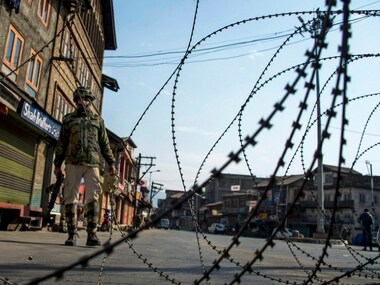One of the most distressing aspects of the ongoing radicalisation of young people in Kashmir is that the age profile appears to be sliding downwards. This trend has gradually gathered pace during this decade, to the extent that it is now touching even babes in arms.
One video on social media shows a baby, no more than about two years of age, crying that 'mujahid' have been killed. The baby repeats this several times, while crying, and then announces its intention to take revenge.
The baby is held in its mother’s arms. It has evidently heard such themes from those around it, for it uses a foul abuse about the army at the end of the little video clip. The adults around the baby can be heard encouraging it and erupting in peals of laughter over the abusive word it utters.
This, of course, reflects the general resentment against the forces among common people. The child has evidently heard such sentiments from its elders and role models and, judging from the laughter and encouragement, they in turn seem pleased that the child has learnt so early. Other videos have also been circulating on social media showing children speaking in a similar vein. Some of these feature girls.
Across large parts of Kashmir, but more so in the south of the Valley, one can see young boys and girls give speeches, sing, or recite poems to a beat at their homes and surrounding places. They come across like performers, as if the children have trained to perform in a way to impress their audience. Many of those performances do indeed impress. Some of them involve reciting to a set beat, like a skilled rap performance.
One has watched a boy no more than about five or six perform such a recitation, full of radical thrusts in both political and religious terms. One has also seen two and three-year-old children chucking little pebbles at each other in the driveway of a house, imitating the stone-pelting some of them have watched, particularly in certain years.
Societal repercussions
Whatever the future may hold for Kashmir in terms of politics or geopolitics, this sort of radicalisation of a generation from its earliest days could have unpredictable social consequences. It could affect cultural norms in fundamental ways. The popularity of militant commander Zakir Musa among Kashmiri youth — and not only in south Kashmir — indicates how far the process of radicalisation has already gone.
Musa achieved rock star status among many teenagers after his audio recording went viral on 12 May, 2017. In it, he threatened to slit the throats and string up in Lal Chowk anyone who called the Kashmiri movement a political one. He explicitly referred to such leaders of the freedom movement as the Hurriyat Conference. Musa succeeded Sabzar Bhat, who took over from Burhan Wani as the militant commander of Hizbul Mujahideen.
After that recording went viral, Musa separated from that pro-Pakistan group. He has now established himself as the face of Al-Qaeda and Islamic State in Kashmir. The state’s Director General of Police SP Vaid recently acknowledged for the first time that Islamic State has a presence in the Valley.
Distant consequences
There was a trend towards radically Islamist thinking among youth in the 1980s too, but the proportion of youth drawn towards it then was relatively small. Kashmir’s traditional ziarat-oriented praxis remained vibrant.
That such young children are now being pulled into the emotional maelstrom of an increasingly radicalised movement bodes ill for the prospect of inclusivity of any sort.
Many Kashmiri activists respond defensively against any effort to highlight this trend, even with regard to its putative effect on the fabric of society within Kashmir. Turning a blind eye to discomfiting societal trends can have tragic consequences.
The sad reality is that this trend is matched by similar trends in other parts of the world, including India. In a virtual world which collapses physical distances, these various other trends will have an impact in Kashmir too, either by boosting local trends or by provoking a reaction.
Published Date: Mar 12, 2018 17:11 PM | Updated Date: Mar 12, 2018 17:11 PM
